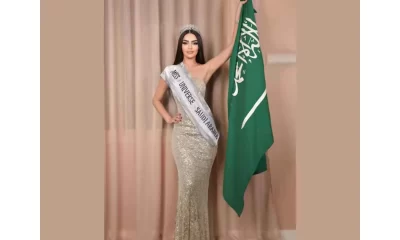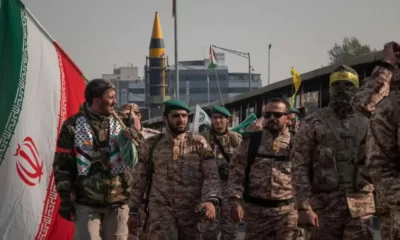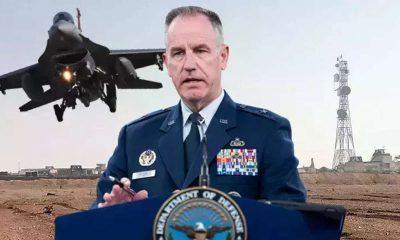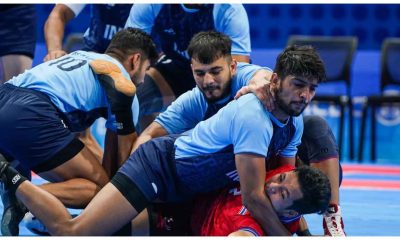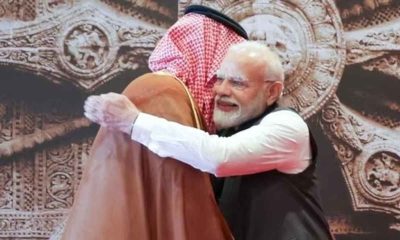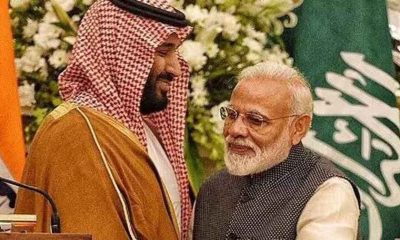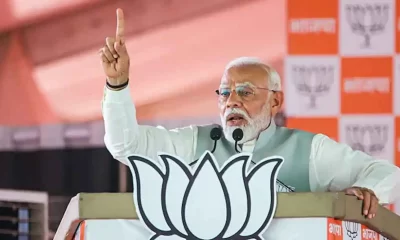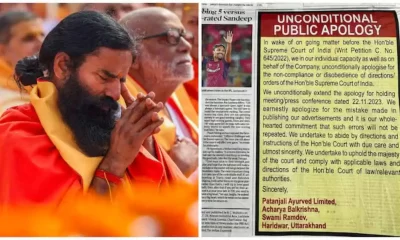Latest world news
Saudi Arabia leads Arab nations in condemning Iran, Hezbollah

Arab League foreign ministers meet in Cairo to discuss Iranian threat to the region
In a swift move Saudi Arabia has led Arab foreign ministers in condemning Iran and Lebanese group Hezballah at an extraordinary Arab League meeting held in Cairo on Sunday. The meeting was held at the behest of Saudi Arabia amid heightened tension with Iran over developments in Lebanon and ongoing war against Yemen.
The Arab foreign ministers’ meeting were also important with the recent resignation of Lebanese PM Saad Hariri in a surprise announcement made from Riyadh. He is currently cooling his heels in Paris, a journey connived by Saudi and French administrations. Hariri cited Iran and Hezballah for meddling in regional affairs and expressed fear of a plot to assassinate him.
Saudi Arabia’s Foreign Minister Adel Jubeir told the foreign ministers of the region that his country “will not stand by and will not hesitate to defend its security” in the face of Iranian “aggression.” He further said, “Any leniency in dealing with their policies would only encourage them more, so we must stand together,” Jubeir said, referring to Iran.
He alleged that Iran was aiming “to destabilise and fuel sectarian rift” on the region “and drive a wedge between ourselves and our people”.
He further said “”This swift response reflects the gravity of the situation our countries are facing … as a result of the ballistic missiles violations of Iran and the blunt interference in the domestic affairs of Arab countries.”
Earlier, Saudi Arabia alleged Iran for supplying long range missiles to Houthi Ansarallah in Yemen, who had recently conducted attack on Riyadh airport. Saudi authorities claimed of destroying the missile before reaching its destination while Houthis said that the missile hit the target successfully. Saudi Arabia called it an Iranian aggression against its territory.
During the meeting Bahrain’s Foreign Minister Sheikh Khalid bin Ahmed Al-Khalifa was quite vocal against Hezbollah saying it was “in total control” of Lebanon. He reportedly alleged that “Iran’s biggest arm in the region at the moment is the terrorist [Hizballah] arm.”
While addressing the Arab foreign ministers Arab League Secretary General Ahmed Aboul Gheit said that they will raise the matter with UN Security Council and other international organizations. He alleged, “Iranian threats have gone beyond all limits and pushed the region into a dangerous abyss.”
He even went on saying that missile which was fired by Houthis towards Riyadh was “Iranian made” and called is as an “unacceptable Iranian message”.
However, the Egyptian diplomat said that Arab League was “not declaring war on Iran at this stage.” He said that Arab League was not asking the Security Council to meet, but they were “just briefing the council and maybe the next stage would be for us to meet and call for a Security Council meeting and submit a draft Arab resolution [against Iran].”
AFP reports that Saudi Arabia requested for Arab League foreign ministers’ meeting to discuss “the violations committed by Iran in the Arab region, which undermines security and peace … around the globe.”
The Arab League accused Hezballah of “supporting terrorism and extremist groups in Arab countries with advanced weapons and ballistic missiles,” in its declaration. It said Arab nations will provide details to the SC of Tehran’s violations for arming Houthi rebels in Yemen. The declaration called Hezbollah as “terrorist organisation”.
Earlier in the day, Iran’s foreign Minister Javad Zarif told state media in Antalya, a Turkish resort city, on the sidelines of a meeting with his Russian and Trukish counterparts, “Unfortunately countries like the Saudi regime are pursuing divisions and creating differences and because of this they don’t see any results other than divisions.” The trilateral foreign ministers meeting was discussing the issues related to Syrian situation.
Saudi Arabia allege Iran of instigating and supporting Yemen’s Houthis and opposition groups in Bahrain where Saudi forces were “helping” Al-Khalifa regime to crush the “protesters” and even denying them right to practice their religion. Majority Shias were denied to organise religious meetings commemorating the martyrdom of Imam Hussein in the month of Muharram recently.
According to Riyadh’s official Al-Arabia.net, in a separate meeting with editors of Egyptian newspapers, the Saudi Arabia’s foreign minister Adel al-Jubeir said that Qatar’s crisis is small matter and and there are more important matters to attend to. Observers believe that he tried to belittle the gulf crisis triggered after Saudi led quartet cut ties with Qatar earlier in June.
Some of the threats he mentioned include the Iranian threat to Arab national security, the fight against terrorism, the Syrian crisis, Libya, yemen’s stability, internal development and implementation of Crown Prince Mohammed bin Salman vision 2030 in Saudi Arabia.
The Cairo meeting was not attended by Lebanese foreign minister Gerban Basil. Instead Antoine Azzam, country’s representative to the Arab League participated in the foreign ministers’ meeting.
Hezballah is part of the coalition government in Lebanese government. PM Saad Hariri, a Sunni leader belongs to Future Movement. President Michel Aoun, has refused to accept Hariri’s resignation and accused Saudi Arabia of holding him against his will. Hariri and Saudi Arabia deny the allegations.
Iran has been helping Iraq and Syria with military advisors in their fight against Daesh (IS) and other terrorist groups. Both countries have recently announced about achieving major successes in their fight against terrorist groups with Wahabi ideology. These groups were allegedly supported by Saudi Arabia, US and Israel.
Recently BBC has carried an investigation on how US and its allies shifted Daesh terrorists from Raqqa, Syria and the way they didn’t allow Russia to bomb the fleeing terrorists from Raqqa. US weapons drop to terrorists was also caught in camera in Iraq. Israel had also admitted providing medical support to the “civilians” injured in Syria. Syria and Iraq have been alleging these countries for their hand-in-glove role in spreading terrorism in the region.
According to Marwan Bishara, a senior political analyst has said that Saudi Arabia had convened the Cairo meeting in a bid to “consolidate its position in a divided Arab region.”
He further says, “The Arab world is divided and a lot of countries convened to Cairo today don’t see eye to eye with Saudi Arabia on its ways and means or how it plans to confront Iran in the region.”
“That doesn’t mean they agree to the escalation of Iranian interference in various Arab countries, but paradoxically it was the incompetence and the division among those Arab countries that was the main factor why Iran is able to expand its influence in the region,” added Bishara.
Latest world news
World Earth Day 2024: Google Doodle showcases aerial view of planet’s natural beauty
Google celebrated Earth Day 2024 with a special doodle featuring an aerial view of our planet’s biodiversity.
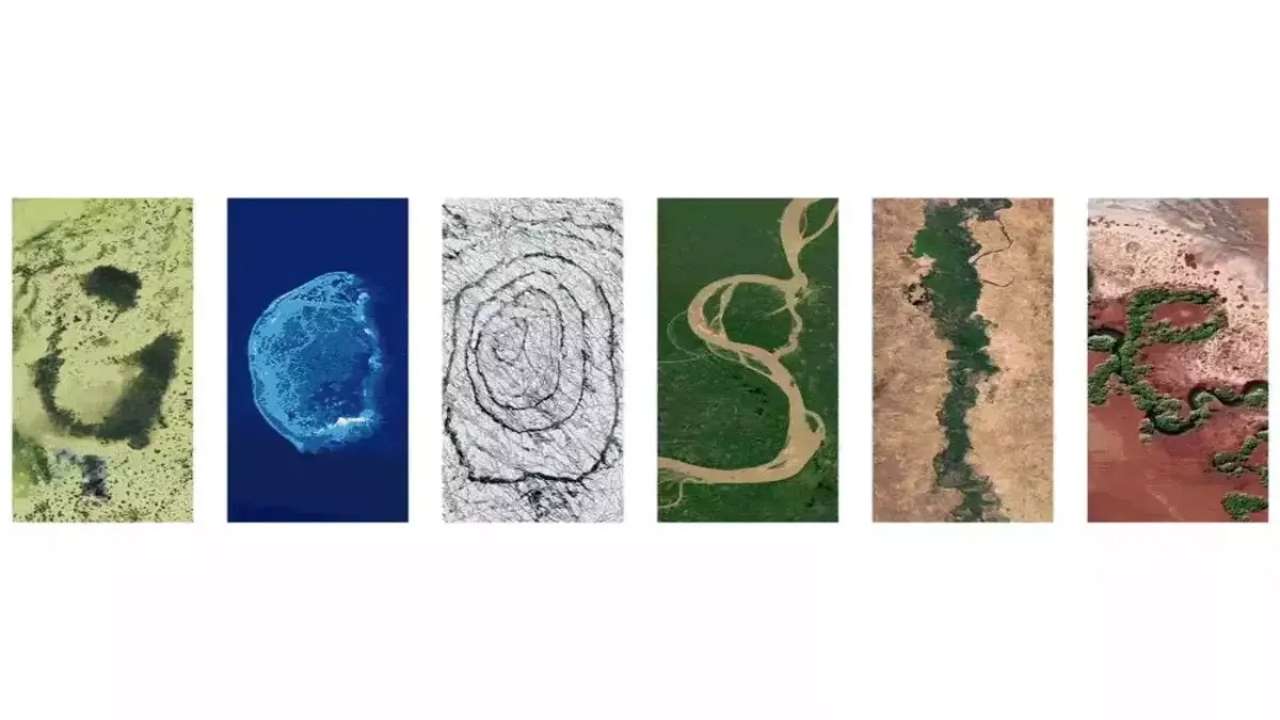
Google shared a doodle today to celebrate World Earth Day 2024, which showcased aerial photos of the planet’s biodiversity and natural beauty. Google reminded us of the importance of protecting planet earth for future generations with the help of this doodle.
The Google letters depict specific locations across the globe where people, communities, and governments work every day to help protect the planet’s natural beauty, biodiversity, and resources, according to the explanation of the annual Earth Day 2024 doodle on their website.
It said, these examples remind us that there’s much more to do to address the climate crisis and biodiversity loss, but also offer the promise of hope and optimism.
The islands of Turks and Caicos are represented by the letter “G.” The islands’ conservation efforts are concentrated on protecting important regions for biodiversity and addressing persistent environmental problems.
The largest reef in the southern Gulf of Mexico and a UNESCO biosphere reserve, Scorpion Reef National Park, is represented by the letter “O” in the Mexican flag.
The letter “O” features Iceland’s Vatnajokull National Park, which was designated as a national park in 2008 following decades of advocacy. The ecology within and surrounding the biggest glacier in Europe is safeguarded by this UNESCO World Heritage Site.
The letter “G” has the Jau National Park in Brazil on it. It is a UNESCO World Heritage Site and one of the biggest forest reserves in South America.
The Great Green Wall of Nigeria is represented by the letter “L,” and the Pilbara Islands Nature Reserves of Australia are represented by the letter “E.”
Meanwhile, Earth Day is a worldwide event that promotes protection of the environment every year. April 22 serves as a reminder of the importance of conservation efforts and sustainable practices to guarantee a healthier world and a brighter future.
The occasion inspires people across the world to come together and take action to protect the environment, strengthening our bonds with nature and promoting good change.
Latest world news
Bigg Boss 14 contestant Rahul Vaidya struggles walking in knee deep water, compares Dubai rains with Mumbai floods
Singer and TV personality Rahul Vaidya was recently stranded in the Dubai rains.

Rahul Vaidya, who was in Dubai ahead of his show which was scheduled to take place today, left the country due to heavy rains and reached Kolkata. The artist shared on social media his encounters in the UAE city, including challenges like walking through knee-deep water. Rahul provided an update regarding the heavy rainfall in Dubai on his Instagram profile.
The Bigg Boss 14 contestant revealed that he was in Kolkata and prepared to do an evening performance. Recalling the terrifying period he went through, Vaidya said there was a lot of confusion and panic in Dubai. The situation was similar to that when heavy floods hit Mumbai in 2005.
Vaiday also posted seval other images and videos of cars that were underwater and flooded roadways. The Bigg Boss 14 contestant, who shared his ordeal, claimed that even though it had just rained for two hours, the situation was dire.
In one of the video, which went viral he can be seen struggling in walking in knee-deep water. He can be also seen holding his sneakers in one hand and with other hand he was seen managing other things.
This is the result of the two hours of rain that it had, he can be heard saying in the video. Vidya also said he dosen’t believe Dubai is accustomed to a lot of rain. Everything had stopped working, he remarked.
After taking part in the first season of the singing reality show Indian Idol, Rahul Vaidya gained widespread recognition. In addition to Bigg Boss, he took part in Khatron Ke Khiladi 11.
Meanwhile, heavy rains that triggered flooding in the UAE and Bahrain, which left 18 people dead in Oman on Sunday and Monday, have paralyzed the financial hub of the Middle East, Dubai.
A lot of incoming flights were diverted from Dubai’s international airport because of the rain. At 7:26 p.m., the busiest airport in the world for foreign visitors stopped accepting new arrivals; a gradual resumption was announced for more than two hours later.
Images of planes navigating flooded tarmacs are making the rounds on social media.
According to pictures shared on social media, the flagship malls Dubai Mall and Mall of the Emirates both experienced heavy floods, while at least one Dubai Metro station had water up to the ankles.
There were several road collapses, severe flooding in residential areas, and numerous reports of leaks from windows, doors, and roofs.
Due to the unfavourable weather, schools around the United Arab Emirates were forced to close, and as more storms are predicted, the closures are anticipated to last until Wednesday. The government of Dubai allowed its staff to work remotely till this Wednesday.
Latest world news
Dubai sky turns green during storm in UAE, video goes viral
The UAE witnessed record-breaking rainfall on Tuesday and the National Centre of Meteorology recorded 254 mm of rainfall in less than 24 hrs in the Khatm Al Shakla area in Al Ain.

1 person was killed in UAE as it witnessed heavy rainfall on Tuesday, stranding commuters, flooding roads, disrupting trains and flights and resulting in water leakage from mall ceilings. The UAE witnessed record-breaking rainfall on Tuesday and the National Centre of Meteorology recorded 254 mm of rainfall in less than 24 hrs in the Khatm Al Shakla area in Al Ain. It is being said that the rainfall was the highest documented since the start of data collection in 1949.
The heavy rainfall in UAE came days after a similar situation in neighbouring Oman, where 13 people were killed in flash floods. Many parts of Oman saw torrential rains, which caused students to be trapped in buses and swept away motorists and trapped people in their homes.
Videos from Dubai circulating on social media showed widespread waterlogging on roads in Abu Dhabi, Dubai and other important cities. This left daily commuters in cars and other vehicles struggling to get back home. Dubai metro station too was seen flooded and closed.
One such video circulating on social media shows the aerial view of the city of Dubai from the top of a building. In the video the stormy winds are seen blowing over the city of Dubai. As the storm intensifies the Dubai sky turns green and ultimately gets covered by heavy rainfall. The video has gone viral on social media with more than 1.1 million views.
Another video showed water leakage from the ceilings of shopping malls, flooding the floors and destroying goods. A video which was shot in the famous Mall of the Emirates, showed pieces of ceiling falling as the rainwater gushed inside. Videos from many outlets of the Deira City Centre mall chain showed escalators being rendered unusable. Majid Al Futtaim, the company which owns the Mall of Emirates, said that the shopping complexes have been kept open and the customers are being sent away from the flooded areas.
-

 Entertainment23 hours ago
Entertainment23 hours agoManisha Koirala reveals reason for rejecting Dil To Pagal Hai, says regrets that decision
-
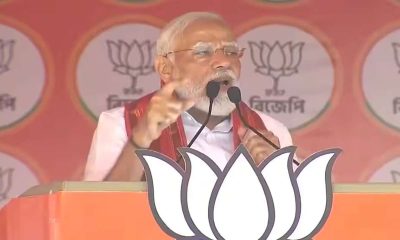
 2024 Lok Sabha Elections22 hours ago
2024 Lok Sabha Elections22 hours agoPM Modi says Congress leaders consider themselves above Lord Ram
-
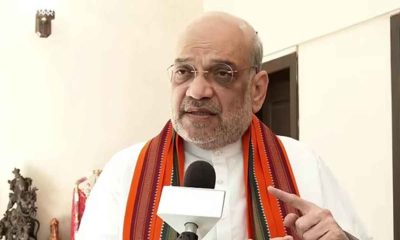
 2024 Lok Sabha Elections24 hours ago
2024 Lok Sabha Elections24 hours agoAmit Shah says neither Congress nor Trinamool chief Mamata Banerjee can interfere with CAA
-

 Trending23 hours ago
Trending23 hours agoDolly Chaiwala sips coffee atop Burj Khalifa, video goes viral
-

 Trending21 hours ago
Trending21 hours agoNexon owner replaces broken side mirror with a plastic mirror, social media users say epic moment
-
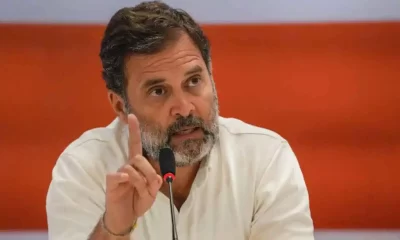
 2024 Lok Sabha Elections4 hours ago
2024 Lok Sabha Elections4 hours agoRahul Gandhi clarifies on wealth survey remark, says aim is to identify injustice
-
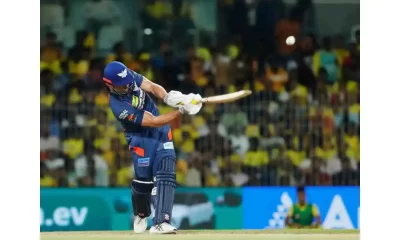
 Cricket news5 hours ago
Cricket news5 hours agoIPL 2024: Marcus Stoinis hits first IPL century as Lucknow Super Giants beat Chennai Super Kings by 6 wickets
-
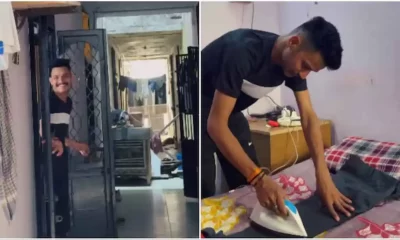
 Trending2 hours ago
Trending2 hours agoA waiter’s life: Social media users go emotional on watching viral video

